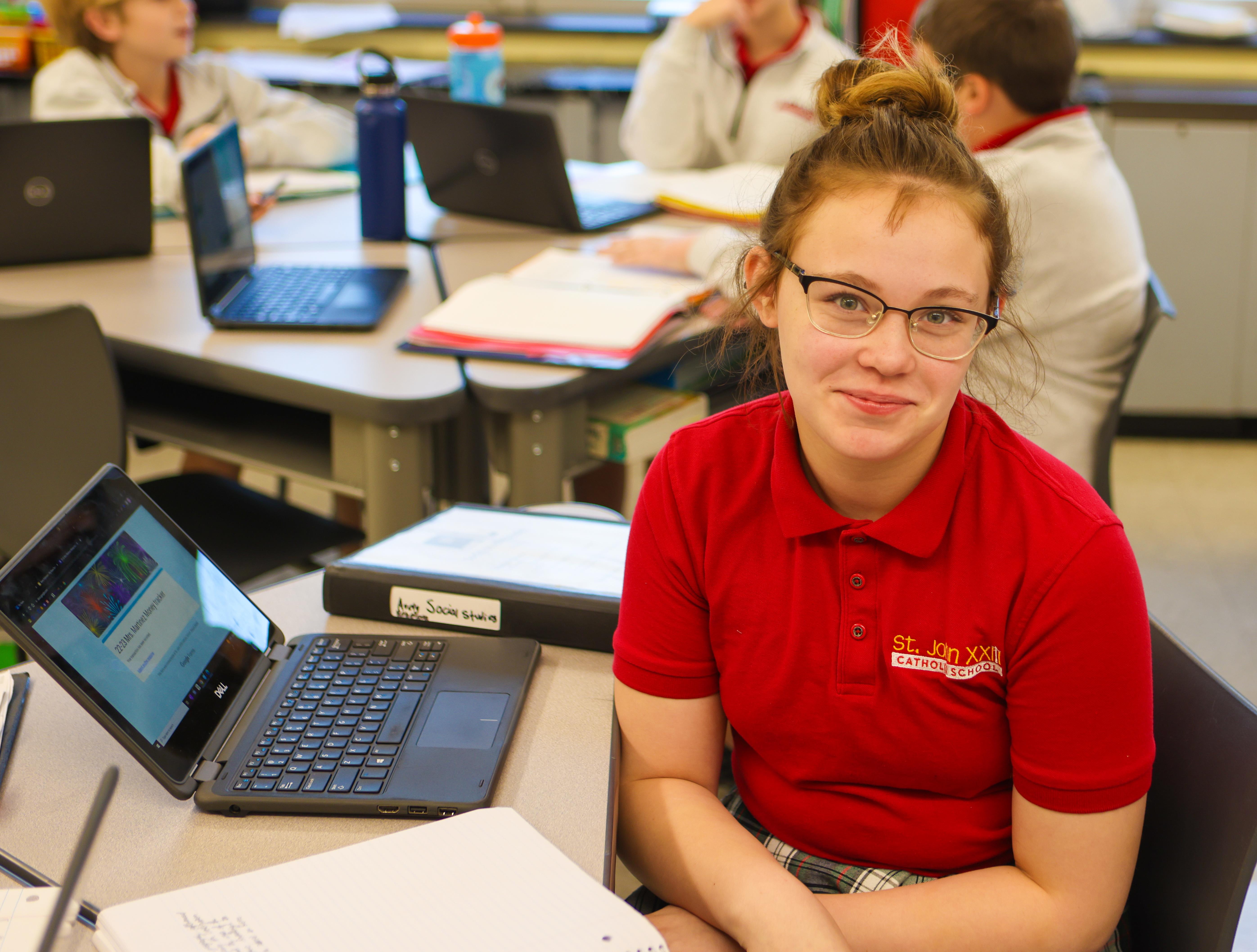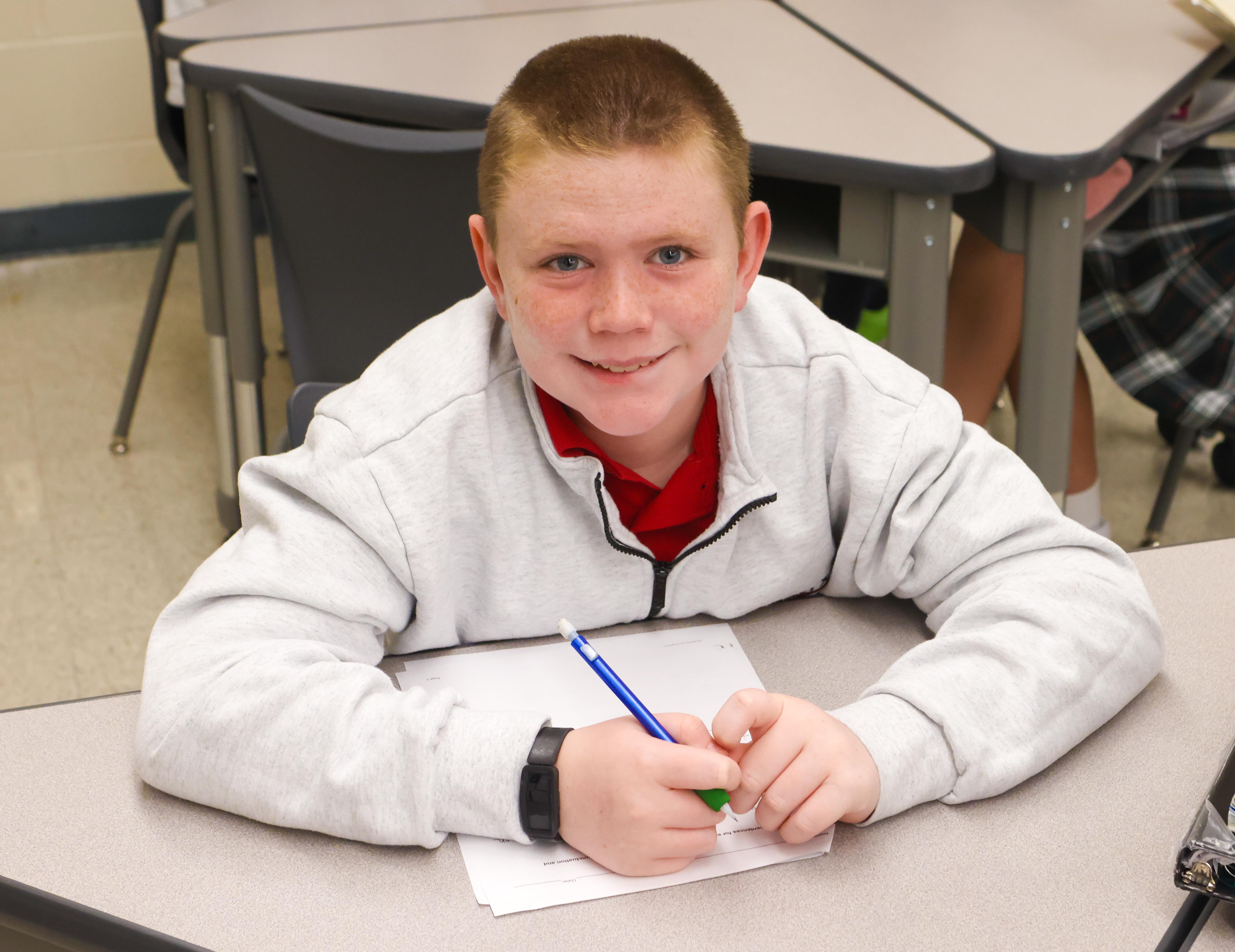Junior High (6th-8th)



Junior High
Language Arts
Students will complete a variety of writing assignments ranging in length from a paragraph to a page or more. Some assignments will be typed or put into presentations to enhance technology and speaking skills. In 6th grade we will focus on advancing research skills and also learn the basic foundations of writing essays. Students will deepen mastery of previous reading skills and introduce some new topics, such as a five-stage plot and more advanced forms of figurative language. Students will read literature of a more difficult text complexity, increase their comprehension abilities, and expand their vocabularies. There will be an emphasis on nonfiction as well as fictional literature.
Religion
Students will grow in their relationship with God and deepen their knowledge and understanding of the Catholic faith and its teachings. The focus in 6th grade is on the Old Testament, including the story of creation, patriarchs and matriarchs, the forming of God’s covenant with the people of Israel, and the fulfillment of his covenant through Jesus Christ.
Math
Sixth grade math concepts include statistical measures, operations with fractions, decimals and integers, ratios and rates, geometric areas, coordinate planes, and problem solving skills.
Advanced Math
Pre-Algebra is a high school math course taken at St. John XXIII as a prerequisite to Algebra 1 by Accelerated Advanced math students in grade 6 and by Advanced math students in grade 7. These students will learn concepts such as writing and simplifying numerical and algebraic expressions, writing/solving/graphing linear equations, working with fractions/decimals/percents, applying ratios and proportions, working with perimeter/area/volume, and using basic probability. In addition, students will use laptops for taking notes and for completing most assignments and are also expected to use a calculator fluently for this class.
Science
Junior high science students are actively engaged in real-world challenges and meaningful projects as they move through the outlined course of study. Paired with content standards and the provided text, these courses are intended to introduce students to scientific ways of thinking and develop students’ skills of observation, organization, and problem solving. In sixth grade, students explore the topics of cells, earth's resources, matter and energy.
Social Studies
In sixth grade social studies students will explore the cultures and histories of Africa, Asia and Eastern Europe. In this endeavor we will develop note taking skills, practice making inferences and further develop key skills related to map reading.
Language Arts
In 7th grade language arts, students will explore literary elements, devices, and techniques used in several genres of literature including fiction, nonfiction, and poetry. Further, this course will expose students to the use of the writing process with emphasis on the ability to write effectively with respect to audience and purpose. Consequently, this course will also emphasize grammar structure and usage. Finally, vocabulary, spelling, and handwriting will be integrated into the curriculum in order to enhance students’ spoken and written language skills.
Religion
In 7th grade religion, students will focus on Knowledge of Faith, Knowledge of Sacraments and Liturgy, Moral Formation, Praying with Christ, Living in the Church Community, Living as a Christian in Society, and Theology of the Body. Further, students will participate in Stations of the Cross this year. Students are also encouraged to take advantage of other discipleship opportunities within the school community as they arise throughout the year.
Math
Seventh Grade math concepts include manipulating complex fractions and mixed numbers, rational and irrational numbers and absolute values, geometric measurements, algebraic expressions, properties of operations, data analysis. Other topics include equations, percentages, integers, solving equations, and geometry.
Advanced Math
Algebra 1 is a high school math course required for graduation. At St. John XXIII, Accelerated Advanced math students take Algebra 1 in grade 7, which allows these students to complete Geometry in grade 8. The Advanced math students will take Algebra 1 in grade 8, which allows these students to take Geometry in high school. Some of the topics learned by students in Algebra 1 are writing/solving/graphing linear equations and inequalities, using linear functions in real-world applications, writing/solving/graphing systems of equations and inequalities, and being introduced to exponents and exponential functions. Once students are through learning the linear concepts of Algebra 1, they learn quadratic concepts such as expanding on exponents and exponential functions, simplifying quadratic expressions, writing/solving/graphing quadratic functions, simplifying/solving/graphing radical functions, and if time permits, simplifying and solving rational functions. In addition, students will use laptops for taking notes and for completing most assignments and are also expected to use a calculator fluently for this class.
Science
Junior high science students are actively engaged in real-world challenges and meaningful projects as they move through the outlined course of study. Paired with content standards and the provided text, these courses are intended to introduce students to scientific ways of thinking and develop students’ skills of observation, organization, and problem solving. Seventh graders examine atoms and the periodic table, as well as biomes and electricity.
Social Studies
Seventh grade social studies explores the history of Europe from Ancient Greece through the European explorers. Students will compare these civilizations and develop an understanding of their lasting effects on later societies, while honing chart development skills and engaging in frequent formal presentations.
Language Arts
In eighth grade, students are offered a sophisticated, diverse language arts curriculum that equips them to navigate the challenges of high school English courses. Students are instructed in the conventions of standard English and master a mature and confident style of writing and orating. Eighth graders continually build and use a complex vocabulary via multimodal instruction tools, and they apply their knowledge of language in myriad contexts. Additionally, students are required to evaluate the purpose and content of various genres of contemporary literature and current informational texts. In eighth grade language arts, students become adept and critical listeners, speakers, and writers who are able to discern the elaborate and complex media in our modern world.
Religion
In eighth grade religion, students embrace their faith as fully-initiated members of the Catholic Church through the sacrament of Confirmation. They also explore the rich history of the Church, focusing on both the divinity and humanity of the institution and its impact on the world. They delve into the Acts of the Apostles, examine the influence of historical Church councils, and fully grasp the concept of the church as "universal". Their intimate, familial relationship with Jesus Christ deepens through personal examination, reflection, and prayer, and they are able to adeptly read the Bible and apply Jesus' teachings to their daily lives.
Math
Eighth Grade math concepts include proportional and nonproportional linear relationships, graphing linear equations, angles of lines, triangles and polygons, geometric volumes and areas, laws of exponents, and solving equations.
Advanced Math
Geometry is a high school math course required for graduation. At St. John XXIII, Accelerated Advanced math students take Geometry in grade 8. These students will learn concepts such as the tools for Geometry, which include working with points, lines, planes, distance and midpoint, and angle measure and relationships. Students will also spend time on reasoning and proof, along with parallel and perpendicular lines, relationships/congruency/similarity of triangles, proportion and similarity of quadrilaterals, right triangles and Trigonometry, transformations, secants/chords/tangent lines of circles, and surface area/area/ volume of pyramids, prisms, cylinders, and cones. In addition, students will use laptops for taking notes and for completing most assignments and are also expected to use a calculator fluently for this class.
Science
Junior high science students are actively engaged in real-world challenges and meaningful projects as they move through the outlined course of study. Paired with content standards and the provided text, these courses are intended to introduce students to scientific ways of thinking and develop students’ skills of observation, organization, and problem solving. In their eighth grade year, students investigate the earth's interior and plate tectonics, genetics and heredity, and finally, forces.
Social Studies
Eighth grade social studies focuses on the development of our great nation. We revisit key themes from sixth and seventh grade that influenced our government, beliefs and economy. Students experience a lot of freedom to explore self-directed learning within the curriculum, which allows them to use the skills they've built to better understand and appreciate our American system.



